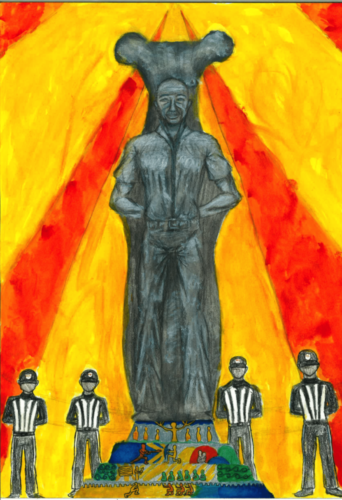Earn Your Stripes: The Legacy of the NFL’s First Black Official
By Kaiyo Funaki
Burl Toler Sr. never sought out attention, nor did he ever want to flaunt his achievements. After all, football officials thrive in anonymity; they operate best in the shadows, only stepping into the spotlight to enforce the rules.
And for 25 years, Toler did just that. He called plays decisively, with composure and conviction. But unlike his crew members, who could fade into the background, Toler carried a burden that no man had ever shouldered before.
In 1965, he earned the distinction of becoming the first Black official to work in the NFL, as well as the first Black official in any professional sport in North America.
Prior to his career on the sidelines, he starred as an All-American center and linebacker for City College. Alongside future Hall of Fame running back Ollie Matson, Toler led the team to a mythical national championship in 1948.
Though he never played football during his youth, he possessed an uncanny combination of size, speed, strength, and intellect that made him a seamless fit on the gridiron.

Dr. Hiawatha Harris, Toler’s best friend from City College, recalled just how dominant he was amongst the competition. “It seemed like every play that was made, there were 11 guys on the field, and they were all named Toler,” he said.
Toler then parlayed his burgeoning athletic career into a scholarship to the University of San Francisco, where he teamed up with Matson and two other future Hall of Famers, Gino Marchetti and Bob St. Clair. In 1951, he was part of the legendary “Undefeated, Untied, and Uninvited” Dons’ team that declined a bid to the Orange Bowl due to its racist regulations.
Toler went on to get drafted by the Cleveland Browns in 1952, but suffered a catastrophic knee injury that derailed any chance of playing professionally.
He finally found his way onto the field 13 years later, albeit in a different capacity than what he had once imagined. Toler’s hiring came at a crucial time, too, with the nation embroiled in civil unrest and a fight for racial and gender equity. Burl Toler Jr. expressed just how daunting a task it was for his father to step out onto the field during that era. “Most people don’t like referees,” he said, “but to be a Black referee was almost like a double whammy.”
While the elder Toler never revealed his experiences with discrimination to his children, it was a testament to his calm demeanor, quiet perseverance, and drive to succeed.
Susan Toler Carr recounted her father’s words of wisdom when it came to his career. “He always said that ‘I may be the first, but if I do my job right, I won’t be the last.’”
This eventually came to fruition as other leagues followed the NFL’s initiative soon after. Emmett Ashford became the first Black umpire in baseball in 1966, while Jackie White did the same for the NBA in 1968.
And though he died in 2009, the impact Toler had in the NFL still resonates today. The NFL featured an all-Black officiating crew for the first time in its 101 year existence just this past year.
Toler’s accolades extended far beyond the scope of athletics. He taught math and physical education at Benjamin Franklin Middle School, and in 1968 became the first Black principal in the SFUSD. He worked on several different academic boards and volunteered at the local Boys & Girls Club. Toler was a police commissioner from 1978 to 1986, working for George Moscone and Dianne Feinstein.
He also was a dedicated father of six who always made time for his wife and children despite his plethora of responsibilities. “My dad was a good guy. Very loving, very family-oriented, soft-spoken, and required the best out of us…in terms of how we treated one another, and how we were educated,” Burl Jr. said.
And through a series of mottos, Toler instilled the qualities and core values that define his family today. “One of his sayings,” Carr said, “was, ‘Always do your best, and your best will be good enough.’”
It was evident that he was a man of his word, for no matter what career he pursued or what groundbreaking achievements he accomplished, Burl Toler always did his best.
